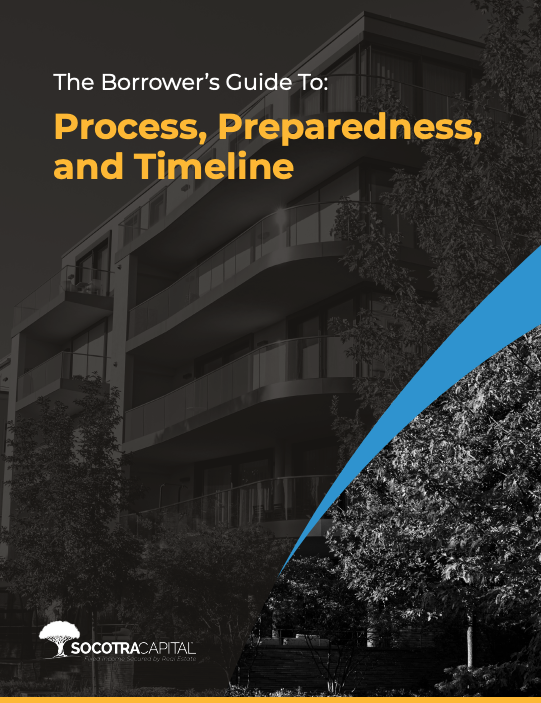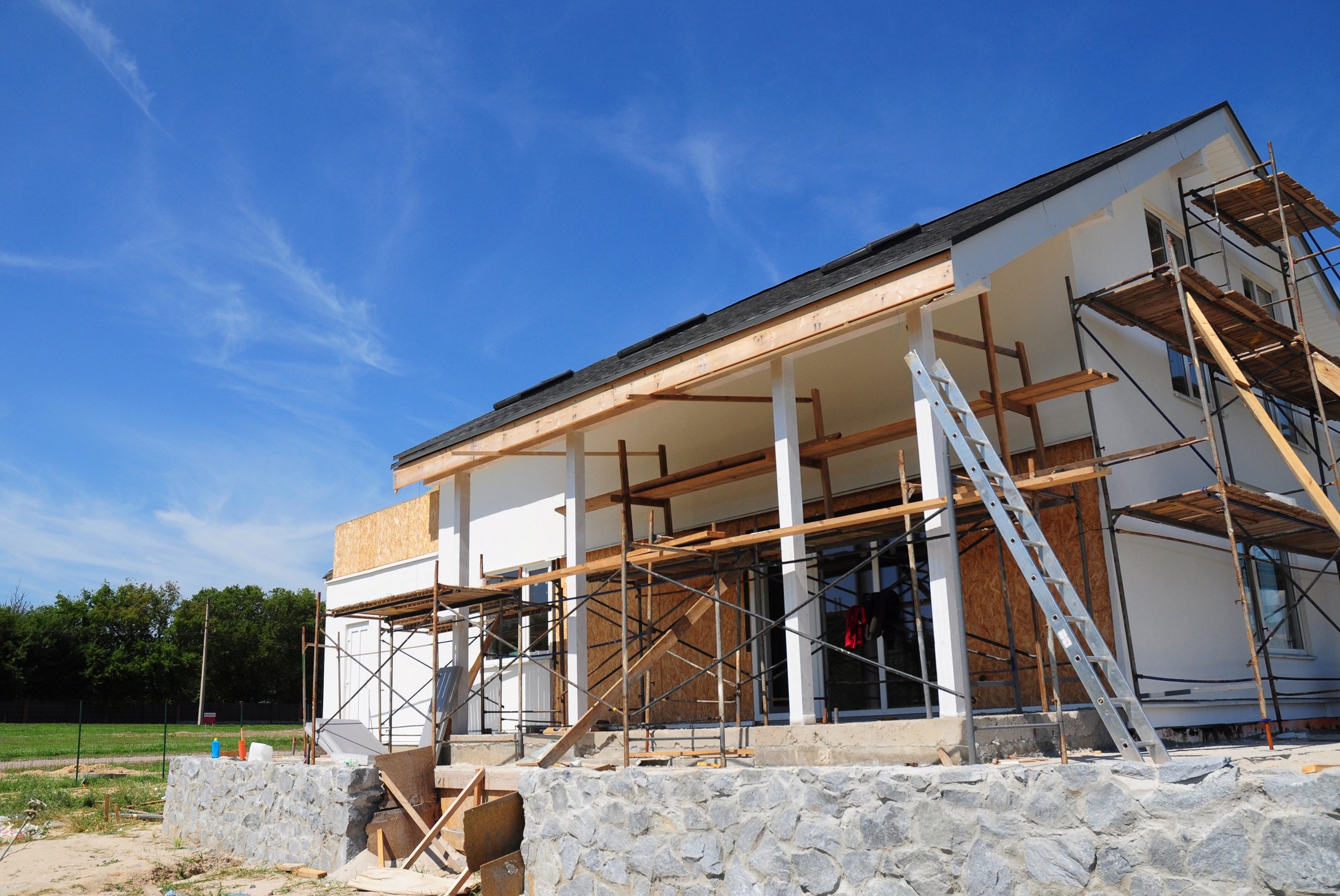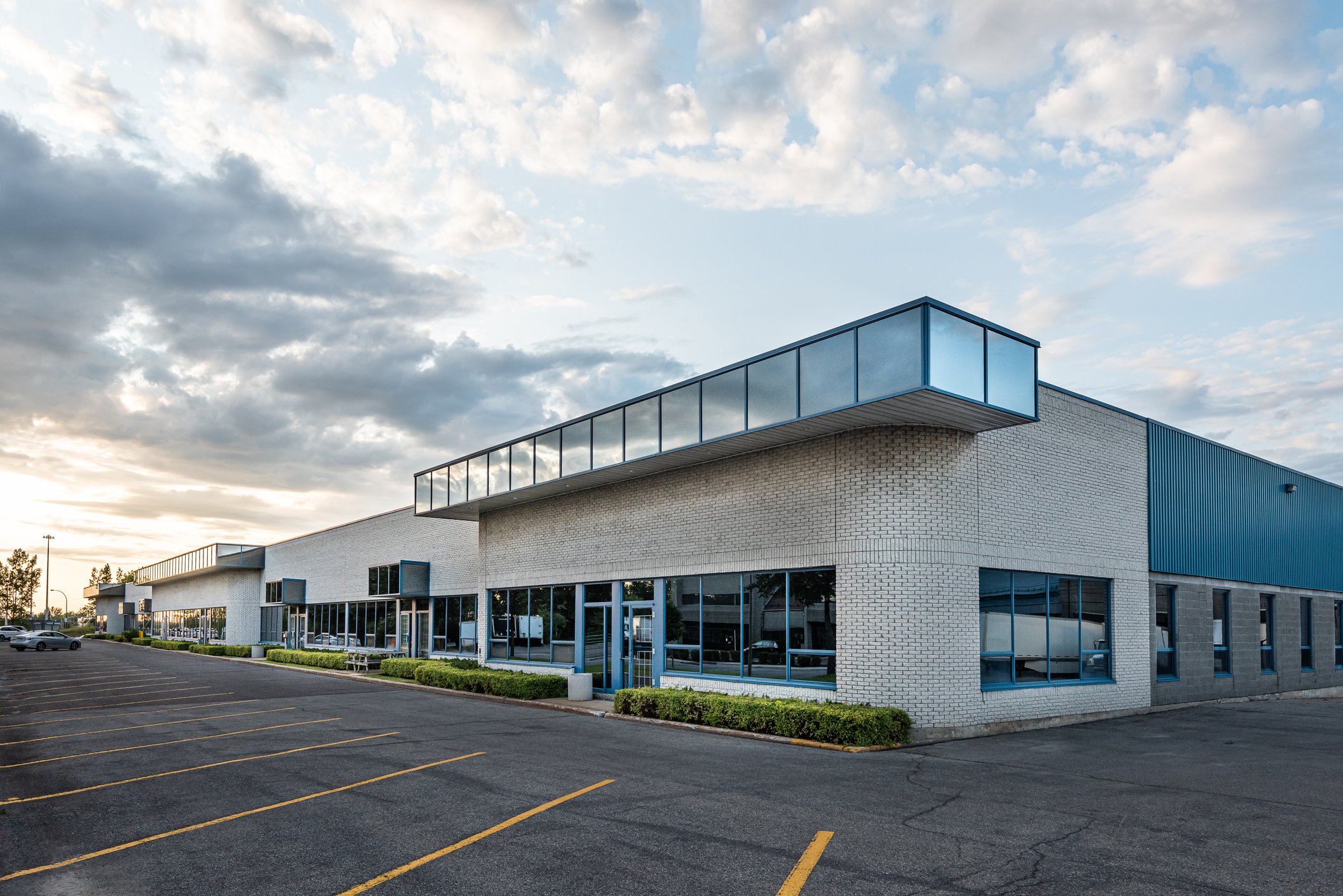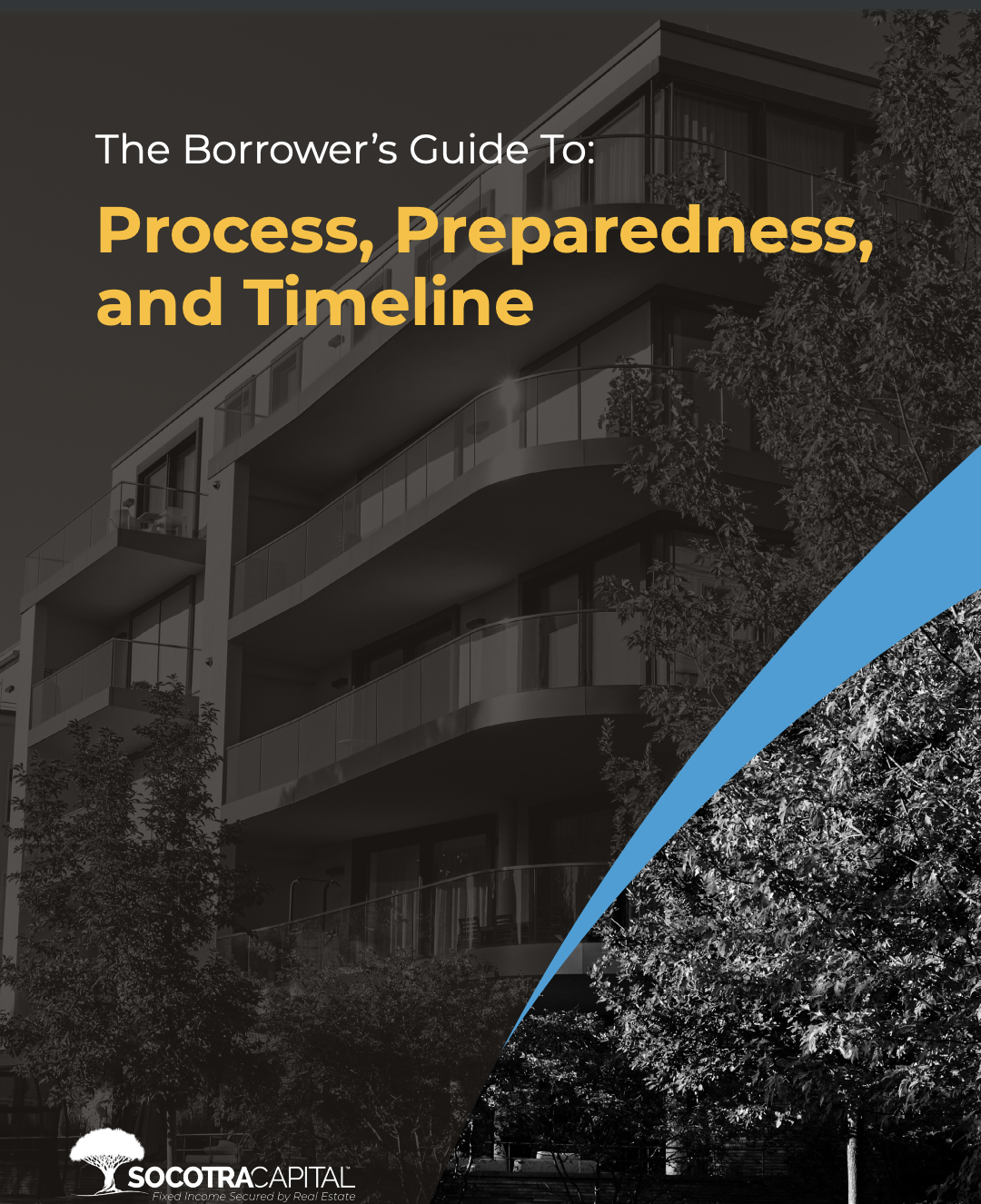THE BORROWER’S GUIDE:
PROCESS, PREPAREDNESS, AND TIMELINE

Introduction
Getting turned down for a loan from a traditional bank is frustrating, but it’s not the end of the road. If you have found an investment property, have immediate capital needs, or need quick cash to keep your business going, alternative lending solutions could be the answer. Hard-money lenders aren’t subject to the same restrictions as traditional banks, so even if you can’t secure a bank loan, you can get the funds you need. In fact, the process is often faster, which is why many investors choose to get a hard-money loan even when bank financing is possible.
Whether you have a questionable credit history or want to invest in a property that doesn’t meet the bank’s standards, if you have equity, you have options. This guide explores some of the most common types of hard-money loans, when it makes sense to get them, and what you need to know before deciding which type of loan is right for you.
Download a PDF version of this guide by filling out this form, or keep scrolling to read.

Chapter 1
Chapter 2
Chapter 3
Chapter 4
Chapter 5
Chapter 6
Chapter 7

Chapter 1
Bridge Loans
As the name suggests, the intent of a bridge loan is to help you cover a financial gap with short-term capital that provides immediate cash flow. Bridge loans are based on your equity, not on your financial history or other factors, which is why they are a good choice for people who can’t get a traditional bank loan because of their personal financial situation.
One of the biggest advantages of a bridge loan is that the quick closing process allows you to gain fast access to cash. The terms range from six months to 20 years, depending on your needs and when you expect to have the cash to repay the loan. Bridge loans are available to individuals and various types of entities, such as LLCs, corporations, IRAs, trusts, and more.
When does a bridge loan make sense? Bridge loans are a good choice for a range of scenarios. Small-business owners, for example, often use these loans to:
- Cover their payroll while waiting for a customer to pay an invoice
- Invest in new equipment to expand the business
- Buy inventory to accommodate a large order before receiving the full payment
Real estate investors also use bridge loans to secure fast cash so they can close quickly on a new rental property. For commercial property owners, this type of loan is commonly used to pay off an upcoming balloon payment or for property improvements to bring in a new tenant.
One of the biggest advantages of a bridge loan is that the quick closing process allows you to gain fast access to cash.
What you need to know before getting a bridge loan Bridge loans typically have higher interest rates and transaction fees compared to traditional home equity loans. However, when your personal financial history makes securing a home equity loan difficult, bridge loans are an excellent option at a reasonable price.
You should get a bridge loan only if you have a high level of confidence that you can pay it off within the stated terms, especially if it’s a lump sum interest payment at the end. When possible, negotiate terms that allow you enough time to work out an exit strategy to pay the loan off, with a little extra padding to account for unforeseen circumstances. It’s also important to understand the risk that you might have to make payments on multiple loans at the same time if you are selling an existing property to finance the purchase of a new one and it doesn’t sell quickly enough.

Chapter 2
Fix-and-Flip Loans
Fix-and-flip loans are used to buy and rehab properties so you can sell them at a profit. With a potentially high ROI in a relatively short period of time, flipping has become a popular investment strategy. The amount of a fix-and-flip loan is based on the value of the property you are fixing and the expected cost of the rehab, but your eligibility depends on your equity in other properties.
Some of the benefits of getting a fix-and-flip loan through a hard-money lender include the following:
- You can get loans for multiple properties.
- The prequalification process is fast, so you can move quickly.
- These loans are available for properties that traditional banks won’t finance.
The terms typically range from six months to 36 months, but most flippers aim to improve and sell the property as quickly as possible.
When does a fix-and-flip loan make sense?
Fix-and-flip loans are a great choice for new investors who need cash to buy a distressed property, fix it up, and flip it. Flipping is becoming more popular as investors recognize the opportunity it provides to make a quick profit.
Experienced investors can also benefit from fix-and-flip loans when they need money to make an all-cash offer on a property. When competition is fierce or the seller wants to close fast, having quick access to cash—in a matter of days—can put you at the top of the buyer list.
Many properties don’t qualify for traditional bank loans, which is one reason people turn to hard-money lenders for financing. Eligibility for fix-and-flip loans does not depend on your personal financial history, so if your credit score is low but you have enough equity, you will likely qualify if the property is viable.
What you need to know before getting a fix-and-flip loan
Fix-and-flip loans are not for everybody, and it’s important to understand the amount of work involved in the rehab process. Make sure you’re confident in your rehab cost and time estimates before securing a fixand-flip loan so you can achieve your profit goals. You should also be prepared for unexpected expenses by building contingency funds into your budget.
Fix-and-flip loans are based on two factors: the after-repair value (ARV) and the estimated cost of the necessary repairs. You should understand how the ARV is calculated to make sure your loan amount aligns with your estimates. If you can’t sell the property for at least the ARV amount, you might not reach your target profit.
It’s also important to know that fix-and-flip loans don’t cover the entire cost of the purchase and rehab work. You need to have enough cash on hand to cover the difference because the loan covers only a certain percentage of the rehab costs.

Chapter 3
Residential Rehab Loans
Residential rehab loans are used to renovate residential properties, either to flip them or to maintain them as rental properties. Similar to a fix-and-flip loan, this type of loan covers both the purchase cost and some of the rehab cost. Like with other types of hard-money loans, eligibility is dependent on your equity and isn’t tied to your personal financial history.
The terms range from six months to 20 years, depending on your plans for the property. If the intent is to fix it up and sell it, the terms are typically shorter. If you plan to fix it up and then maintain it as a rental property, longer terms might make more sense.
Similar to a fix-and-flip loan, this type of loan covers both the purchase cost and some of the rehab cost.
When does a residential rehab loan make sense?
This type of loan is suitable for individuals who need quick cash to buy a property if they are unable to secure a traditional mortgage because of bad credit. A hard-money residential rehab loan is also a great solution for a fixer-upper that doesn’t qualify for a traditional loan because of the condition of the property.
What you need to know before getting a residential rehab loan
Much like with a fix and flip, it’s important to understand your renovation costs and timeline before agreeing to terms and finalizing a residential rehab loan. The loan covers only part of the rehab expenses, which means you need to make sure you have enough cash to cover the remainder of your rehab expenses so your project doesn’t stall out.

Chapter 4
Cash-Out Refinancing
For cash-out refinancing, commercial property owners can refinance the property at a higher value than that of the existing mortgage and keep the difference as cash. If the property is a home, at least 51 percent of the loan must go toward a business purpose.
When does cash-out refinancing make sense?
This type of financing allows business owners who need cash to leverage their existing equity for a first-time investment opportunity. Cash-out refinancing is also a good option for businesses that need cash to cover payroll and operating expenses during difficult financial times.
What you need to know before getting a cash-out refinance loan
You should be aware of the closing costs and other fees to make sure the refinancing is worth it. In some cases, if you need fast cash, the cost is well worth it, especially if you are jumping on a lucrative investment opportunity. For interest-only loans, make sure you will be able to repay the principal amount when the term has expired.
.webp?width=3000&height=1000&name=chapter-hero-image%20(1).webp)
Chapter 5
Buy-and-Hold Loans
A buy-and-hold loan is a longer-term loan that is usually used to purchase rental properties that will generate passive income. Many investors also use this type of loan to time the real estate market, purchasing a property during a dip and selling it later, when the value has increased due to their improvements or fluctuations in the market. A buy-and-hold loan is not for primary residences, and in order to qualify, the property cannot be owner-occupied.
When does a buy-and-hold loan make sense?
Buy-and-hold loans are appropriate if you are purchasing a rental property and need quick capital to close the deal. They are also a good solution if you find an undervalued property that you know you can eventually sell at a higher price.
What you need to know before getting a buy-and-hold loan
Unfortunately, nobody controls the real estate market, so although you might be confident that you can sell the property at a higher price, be prepared to pay the difference if the property value doesn’t increase and you have to sell it at a loss. If you plan to rent the property, make sure you have enough cash flow to cover vacancies or tenant defaults before you decide to get a buy-and-hold loan.

Chapter 6
Short-Term Rental Loans
Short-term rental loans are used to purchase properties that are suitable for short-term vacation rentals. Many traditional banks do not offer financing for this type of use, but with a hard-money lender, if you’ve got equity, you can probably secure this type of loan.
This type of loan is often used for purchasing properties that require repairs before being placed on the rental market.
When does a short-term rental loan make sense?
If you manage short-term rentals or are looking to get started with this type of investment, this type of loan allows you to secure financing to jump on a good deal for short-term rental purposes when a traditional bank won’t provide it. This type of loan is often used for purchasing properties that require repairs before being placed on the rental market
What you need to know before getting a short-term rental loan
Before you commit to this type of loan, it’s important to understand the short-term rental market and regulations in your area. Do some research on the legislation history, any groups that support or oppose it, and what the vacation rental market looks like in your area. Be prepared to cover expenses during long periods of vacancy and other unexpected costs, and make sure you can also pay your monthly loan costs even if you’re not generating rental income.
.jpg?width=2000&height=1500&name=GettyImages-1189942819%20(1).jpg)
Chapter 7
Top 13 Questions to Ask When Getting a Hard-Money Loan
It’s important to understand the risks when you’re taking on debt of any kind. If you’re considering a hard-money loan, be sure to ask the following questions.
1. What financial information do I need to prepare?
The more information you have handy, the faster the application process will go. Ask your lender what documents they require in regard to your personal equity and any real estate you’re considering buying.
2. What information do I need to provide about the property?
For loans that are based on the value or potential value of a property, such as fix-and-flip and residential rehab loans, find out what information the lender needs in order to make a decision. This could include an appraisal.
3. What are the terms
Know when your loan expires and what you will owe at that point. For interest-only loans, this is the principal amount. Other types of loans might have a balloon payment. Terms are typically shorter for a fix-and-flip loan, usually 9-18 months, and longer for buy-and-hold loans, which are usually 24-36 months. Some private lenders will go even longer with some amortization.
4. What is the interest rate?
Interest rates from hard-money lenders are often higher than those of traditional banks, but that doesn’t mean they’re a bad option. In some cases, you might not be able to secure a bank loan. In any case, you should know what your interest rates are and how they affect the total cost of the loan.
5. What are the associated fees?
Many hard-money lenders charge up-front fees for loan origination. Ask what these fees are so you’re prepared to pay them when the time comes.
6. When are funds distributed for the various types of loans?
Some loans provide an immediate cash-out at the closing of escrow, whereas others distribute funds throughout the course of the rehab project.
7. Is the lender local?
Just like with traditional banking, if you build a relationship with a local hard-money lender, it’s easier to contact the appropriate people when you need them. Whether you want to renegotiate terms or act on another investment opportunity, a local lender will be able to offer help when you need it.
8. Will the loan be based on the ARV or the current value?
Depending on the type of loan, the amount might be based on the estimated value of the property after it has been improved, or the actual current value. Understanding how each type of loan works will help you decide which one is right for you.
9. How is the ARV calculated?
If your loan is based on the ARV, make sure you understand how the lender calculates the value and that their valuation method is in line with your own. If they don’t see the same ARV, your loan amount could potentially be less than expected.
10. How much will an appraisal and any other required reports cost?
As part of the approval and closing process, you might need to lay out money for an appraisal or pay other fees associated with the transaction.
11. Is there a penalty for prepayment?
It’s always great news when you’re able to pay off a loan early, unless your lender tacks on fees for prepayment. If you think you might be able to pay off the loan before the term expires, find out whether there are any associated penalties.
12. How long does the closing process typically take?
If you’re trying to act fast on an investment opportunity, every day matters. Ask about the typical closing time so you can set realistic expectations with the seller. You want to make sure your lender can perform in a timely manner, especially when you have important deadlines approaching. Ask for some examples to see if the lender you are considering is a good fit for your needs.
13. Do you have references or testimonials?
Always ask a hard-money lender for testimonials and references so you can learn more about what it’s like to work with them. If a lender can’t readily provide this, it’s a red flag.
Socotra Capital Is Here to Help
Whether your business is facing tough financial times or you want to take advantage of a hot investment opportunity, Socotra Capital is here to help you when you need fast cash and a traditional bank loan is not an option. With quick preapproval and closing times, hard-money loans allow you to make competitive offers when you spot a hot deal.
Forward this on to a friend
Know someone who might be interested in what you just learned? Fill out the form below to get a copy you can share.








